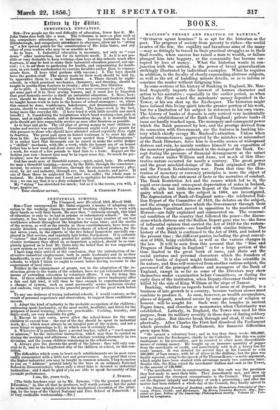INDUSTRIAL SCHOOLS.
The Vineyard, near Hereford, 19th March 1846. Sra—Your correspondent Mr. Oates suggests a means of adapting edu- cation to the working classes by means of teaching children to work with their hands as well their heads. He says that, " curiously enough, this kind of education is only to be had in prisons or reformatory schools." On the contrary, it has been in full operation in a very large number of our best workhouse schools throughout the kingdom for some time ; and the merits of the system, as well as the results in these establishments, have been an- nually detailed, accompanied by balance-sheets of school produce for the last seven years, in the reports of the five School Inspectors specially em- ployed in that service, and regularly laid before Parliament. It is certainly "curious" that these reports, printed for public information, and the con- clusive testimony they afford on so important a subject, should be so com- pletely ignored as to lead Mr. Oates into the belief that he was suggesting a new system as yet very partially tested.
I have long since arrived at the conclusion, that the introduction of in- structive industrial employment, both in spade husbandry and in in-door handicrafts, is one of the most essential of those improvements in common schools, to which I think we ought to resort before having recourse to the experiment of local rates.
Neither in the enlargement of grants, nor in the adaptation of the in- struction given to the wants of the scholars, have we yet exhausted obvious means of extending education by voluntary efforts. I am for doing this first. If these additional inducements and facilities prove inadequate after a fair and full trial, it will then be time enough to experimentalize on a change of system,. such as must necessarily revive sectarian rivalry and contests, very perilous to the peaceful progress of the great work before us.
To any one desirous of trying industrial schools, I would venture, as the result of personal experience and observation, to suggest these conditions of success.
1. Adapt the kind of industry to the probable occupation of the children ; embracing spade husbandry, as the most useful, healthful, and fitted for the gory ses of moral training, wherever practicable. Cooking, laundry, and dafiryo-work, are very desirable for girls. - 2. Except in rare cases, never allow the school-hours for the same children to exceed four: the rest of the day should be spent in industrial work, &c.; which must always be an integral part of the system, and not a mere fringe or appendage to it ; in which case it certainly tails.
3. Wherever it is possible, have a second teacher, called a " work-master or mistress," for the industrial instruction, which may thus be carried on during the morning and afternoon: the scholars working alternately in two divisions, and the young children remaining in the school-room. 4. Always give the parents the profit of the labour : they will only con- sent to it, and to the lengthened stay of the children at school, on this con- dition.
'he difficulties which seem to beset such establishments are in most cases easily surmounted with a little tact and perseverance. As a proof that even the higher industrial arts may be taught in common' schools, I beg to enclose to you an "Address" printed lately by the boys at an ordinary National School in Gloucestershire', where only a short time is' industrial instruction to ndustrial instruction ; and I shall be glad if you are able to speak favourably' of this juvenile performance.
Education," is, like all that he produces, well worth,perusal; but the point he submits for our opinion relates to,the niecbanicol execution of the pnnt- ing, by the boys of the United National and. Free School at Painswick : it is very creditable workmanship,--r-En.]


























 Previous page
Previous page